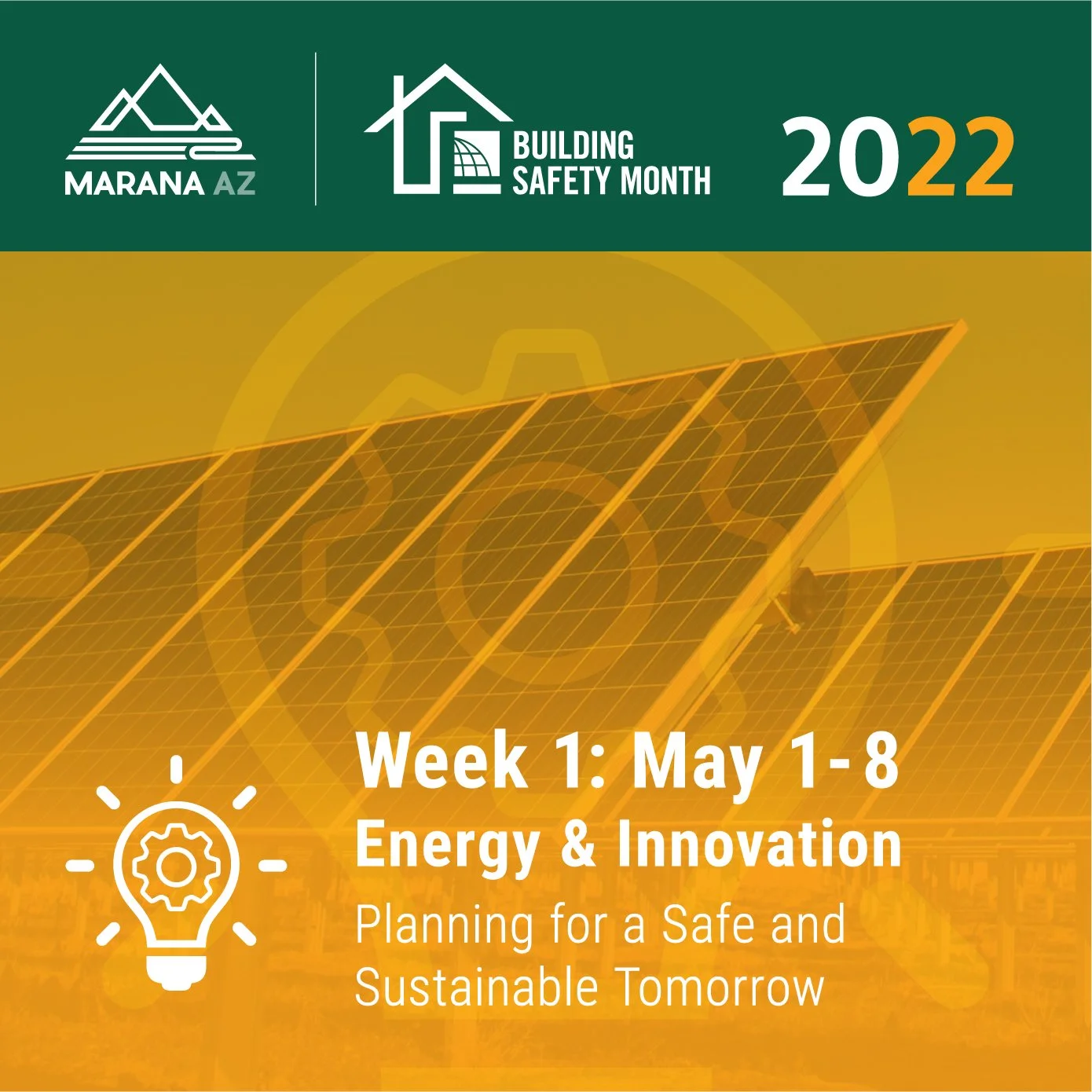Building Safety Month is an international campaign that takes place in May to raise awareness about building safety. This campaign reinforces the need for the adoption of modern, regularly-updated building codes, and helps individuals, families and businesses understand what it takes to create safe and sustainable structures.
View the Town of Marana Council Proclamation declaring May 2022 as “Building Safety Month”.
Week 1: Energy & Innovation
The building safety industry is focused on creating safe & sustainable construction by addressing the key areas of energy efficiency, building science and innovation.
Week 2: Building Safety Careers
Professions within the building safety field vary widely in their specialties, and the industry offers many well-paying career options for today’s workforce:
Building inspectors inspect structures to determine compliance with the various building codes and standards adopted by the jurisdiction.
Building officials manage the development, administration, interpretation, application and enforcement of the codes adopted by their jurisdiction.
Special inspectors provide a specialized inspection of structural material fabrication and placement, such as poured concrete, structural steel installation and fasteners, etc.
Permit technicians assist in the issuance of construction and development permits to ensure compliance with the provisions of a jurisdiction’s adopted regulations and codes
Fire marshals develop and deliver fire prevention and implements public fire safety programs that provide for inspections of occupancies for life safety and fire issues in accordance with codes and standards adopted by their jurisdiction.
Plumbing inspectors inspect the installation, maintenance and alteration of plumbing systems complete with their fixtures, equipment, accessories, and appliances.
Electrical inspectors check the quality of materials, the installation work, and the safeguards in electrical systems. They make sure electrical systems meet city, state or national codes, and electrical codes and standards. Electrical inspectors look closely at new wiring and fixtures in businesses, public buildings, and in homes.
Mechanical inspectors focus on heating, ventilating and air-conditioning (HVAC) concerns. This includes inspection of: mechanical appliances and equipment; air distribution systems; kitchen exhaust equipment; boilers and water heaters; hydronic piping; gas piping systems; flammable and combustible liquid storage and piping systems; fireplaces, chimneys and vents; refrigeration systems; incinerators and crematories. The mechanical inspector also checks for air quality and energy conservation measures.
Public works inspectors check digging and fill operations, and the placement of forms for concrete. They observe the concrete mixing and pouring, asphalt paving and grading operations and keep records of all work performed and the materials used. Public works inspectors may be specialists in one kind of operation such as reinforced concrete, dredging or ditches.
Property maintenance or housing inspectors inspect existing buildings to check for health or safety violations and the condition of the exterior property.
Plan reviewers or examiners begin the evaluation process which ensures that a building or structure conforms to the requirements of the local or specified code. The plan reviewer examines the construction documents used to describe a project, including architectural, structural, site plan, mechanical, plumbing, electrical and fire protection drawings as well as the corresponding specifications, structural design calculations and soil report.
Code enforcement officers evaluate and enforce local building codes. They typically issue warnings or give citations for any code violations they find.
Week 3: Disaster preparedness
Natural disasters are increasing in severity and frequency. Preparing for devastating events like hurricanes, floods, snowstorms, tornadoes, wildfires and earthquakes helps individuals and communities increase the health and safety of their population during a disaster, protects the local tax base, ensures continuity of essential services, and supports a faster recovery in the aftermath of a disaster.
Understanding the Four Phases of Emergency Management can help us better prepare for natural disasters.
Week 4: water safety
Clean water is the world’s most precious commodity. According to World Health Organization estimates as of June 2019, 785 million people lacked even a basic drinking-water service, including 144 million people who are dependent on surface water.
Building, plumbing and green codes help guard our potable water for future generations through proper construction, conservation and safe disposal. Code officials are vigilant protectors of our water supply. Because of their dedicated service, you can turn on the tap in your home and draw sufficient, clean water.
It is important to understand where your water comes from and what's being done (and how you can help!) to protect the water you use every day.
Learn more about Marana’s water future at www.maranaAZ.gov/water-future.





